
Medical Debts are Non-Consumer and May Help Debtors Avoid the Means Test to Qualify for Bankruptcy
We previously discussed how student loans can be considered non-consumer debt which helps a debtor avoid the sometime harsh consequences of the Chapter 7 means test, the presumption of abuse and the ability of the U.S. Trustee’s Office to object to discharge. One often overlooked category of debt which may further assist a debtor in qualifying for Chapter 7 bankruptcy are medical debts which could be classified as non-consumer debts. Under the prevailing legal definition and test, necessary medical expenses should be classified as non-consumer debts and help debtors qualify for bankruptcy.
The bankruptcy code defines consumer debt as “debt incurred by an individual primarily for a personal, family, or household purpose.” 11 U.S.C. § 101(8). To determine whether a particular debt is a consumer debt within the meaning of § 101(8), courts consider the primary purpose for which it was incurred. Consumer debt generally: (1) is incurred voluntary; (2) for personal or household purposes; (3) results from consumption rather than earning money; and (4) involves the extension of credit. In re Westberry, 215 F.3d 589, 591 (6th Cir. 2000). This test for medical debt differs from the profit motive test for student loans which suggests that different types of tests are permissible when determining whether an obligation is a consumer or non-consumer debt.
Although there is a lack of case law and authority on the topic, most medical debt should be considered non-consumer debt because it is likely not incurred voluntarily and does not involve the extension of credit. This is a tremendous benefit for higher-income debtors seeking to avoid the means test. But this only applies to necessary medical debts. Voluntary medical debts such as cosmetic procedures would likely not qualify. Lastly, the lack of authority and courts that have rule on the topic suggests that the U.S. Trustee’s Office does not often challenge debtors who have considerable medical debt.

